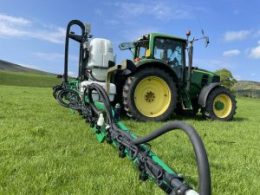The European Union is committed to ensuring a sustainable and environmentally friendly food system. To achieve this, the EU has set ambitious targets for reducing greenhouse gas emissions and increasing the use of renewable energy sources.
The agricultural sector is a significant contributor to the EU’s greenhouse gas emissions, accounting for around 10% of the total. To address this, the EU has implemented policies aimed at reducing emissions from agriculture, such as the Common Agricultural Policy (CAP).
The CAP is a key instrument for promoting sustainable agriculture and reducing the environmental impact of farming. It provides financial support to farmers who adopt environmentally friendly practices, such as organic farming, agroforestry, and conservation agriculture.
Organic farming, for example, is a method of farming that avoids the use of synthetic fertilizers and pesticides. It promotes biodiversity, soil health, and ecosystem services, and can help to reduce greenhouse gas emissions.
Agroforestry, on the other hand, involves integrating trees into farming systems. This can help to sequester carbon, reduce soil erosion, and promote biodiversity.
Conservation agriculture, meanwhile, involves minimizing soil disturbance, maintaining soil cover, and using crop rotations. This can help to reduce soil erosion, improve soil health, and promote biodiversity.
The EU is also promoting the use of renewable energy sources in agriculture, such as biogas and solar power.
Biogas, for example, is a type of renewable energy that is produced from the anaerobic digestion of organic matter, such as crop waste and animal manure. It can be used to generate electricity, heat, and fuel for vehicles.
Solar power, meanwhile, is a type of renewable energy that is generated from the sun’s rays. It can be used to generate electricity and heat for homes, farms, and businesses.
The EU is also promoting the use of precision agriculture, which involves using advanced technologies, such as drones and satellite imaging, to optimize crop yields and reduce waste.
Overall, the EU’s policies and initiatives aim to promote sustainable agriculture and reduce the environmental impact of farming. By adopting environmentally friendly practices and using renewable energy sources, farmers can help to ensure a sustainable food system for future generations.
The future of farming in Europe is bright, with many opportunities for innovation and growth.
As the EU continues to promote sustainable agriculture and reduce its environmental impact, it is likely that the agricultural sector will play an increasingly important role in the EU’s transition to a low-carbon economy.
The EU’s commitment to sustainable agriculture is a key part of its efforts to address climate change and promote sustainable development.
By working together, farmers, policymakers, and other stakeholders can help to ensure a sustainable food system for future generations.









